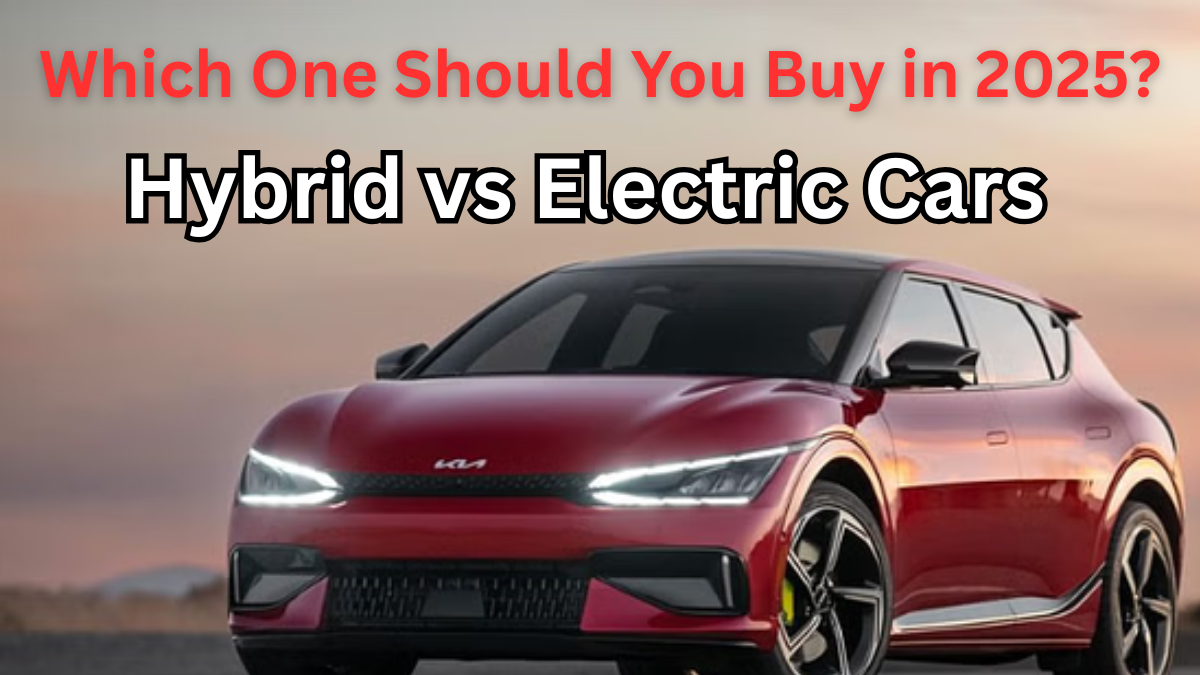As the world shifts gears toward sustainable living, car buyers in 2025 are asking an important question: Hybrid vs Electric Cars – which one should I choose? With both technologies improving at lightning speed, making the right pick can be overwhelming. Whether you’re a city commuter, a weekend traveler, or someone simply trying to reduce your carbon footprint, this guide will help you weigh your options clearly.
Let’s break down the difference between hybrid and electric cars, compare fuel economy, cost, convenience, and overall ownership experience—so you can confidently make the right choice this year.

What’s the Difference Between Hybrid and Electric Cars?
Before diving into comparisons, it’s essential to understand the basics.
| Feature | Hybrid Cars | Electric Cars (EVs) |
|---|---|---|
| Power Source | Combines gasoline engine + electric motor | Fully electric motor powered by a battery |
| Fuel Type | Gasoline + Electric | 100% Electricity |
| Charging | No plug-in needed (unless it’s a plug-in hybrid) | Requires charging station or home charger |
| Range | Higher due to fuel tank | Lower but improving with advanced battery tech |
| Emissions | Lower than traditional cars | Zero tailpipe emissions |
| Maintenance | Similar to gas vehicles | Fewer moving parts, generally lower maintenance |
EV vs Hybrid: Which Has Better Fuel Economy?
If you’re focused on fuel economy comparison, both options offer significant savings over gasoline cars—but in different ways.
-
Hybrids offer great mileage since they use a combination of fuel and electricity. Most hybrids average between 40–60 MPG.
-
Electric Vehicles (EVs) don’t use fuel at all. Their efficiency is measured in MPGe (Miles Per Gallon equivalent), with many EVs exceeding 100 MPGe.
Fuel Economy Quick Look
| Category | Hybrid | Electric (EV) |
|---|---|---|
| City Mileage | 50-60 MPG | 100-130 MPGe |
| Highway Mileage | 40-50 MPG | 90-120 MPGe |
| Fuel Cost (Annual Avg.) | $800-$1,200 | $300-$600 (electricity) |
Verdict: For pure fuel savings, EVs win—especially if you can charge at home.
Cost: Upfront vs Long-Term
Both hybrid and electric cars may cost more upfront than traditional vehicles, but they make up for it in long-term savings.
| Cost Factor | Hybrid Cars | Electric Cars (EVs) |
|---|---|---|
| Starting Price | $25,000 – $35,000 | $30,000 – $50,000 (Before incentives) |
| Federal Incentives | Limited or none | Up to $7,500 (USA), more globally |
| Maintenance Costs | Moderate | Lower (no oil changes, fewer parts) |
| Charging Equipment | Not required (unless plug-in hybrid) | $500 – $2,000 for home charger |
Tip: Check if your region offers EV tax credits or rebates, which can significantly cut down the cost of electric cars in 2025.
Convenience & Daily Use
Let’s talk about real-world practicality.
Hybrids Might Be Better If
-
You drive long distances regularly
-
Charging infrastructure is limited in your area
-
You want better fuel economy without range anxiety
EVs Might Be Better If
-
You mostly drive within city limits
-
You have access to home or workplace charging
-
You want zero-emission driving
Environmental Impact: Who’s Greener?
If your top concern is reducing your environmental footprint, EVs are the clear winner.
| Impact Factor | Hybrid Cars | Electric Cars (EVs) |
|---|---|---|
| Emissions | Lower than gas cars | Zero tailpipe emissions |
| Energy Source | Fossil fuel + electricity | Fully electric |
| Battery Recycling | Growing tech | Improving rapidly |
Final Verdict: EV vs Hybrid – What Should You Buy in 2025?
The choice between hybrid vs electric cars really comes down to your lifestyle and priorities:
-
Choose a Hybrid if you want great mileage without worrying about charging.
-
Choose an EV if you want to go all-in on sustainability, lower running costs, and future-ready tech.
Key Considerations
-
Your daily driving distance
-
Charging access at home or nearby
-
Budget (upfront vs long-term savings)
-
Environmental commitment
In 2025, EVs are more practical than ever. But hybrids still offer a reliable middle ground, especially for people transitioning from gas-powered cars.
FAQs
1. What’s the biggest difference between hybrid and electric cars?
Hybrids use both gasoline and electricity, while EVs run entirely on electric power with no gas tank at all.
2. Are electric cars cheaper to maintain than hybrids?
Yes, EVs generally have fewer moving parts, no oil changes, and lower maintenance costs over time compared to hybrids.
3. Which has better resale value—EV or hybrid?
This depends on the make and model, but as EV adoption rises, many electric cars are holding their value well, especially popular models like the Tesla Model 3 or Ford Mustang Mach-E.
4. Is it worth switching to an EV in 2025?
Yes, especially if you have access to home charging and want to reduce fuel and maintenance costs. With growing infrastructure and tax incentives, EVs are more viable than ever.
Click here to learn more
